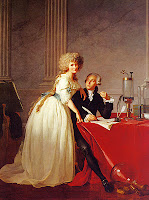Here is a tidbit of chemistry history, from
The Illustrated Almanac of Science, Technology, and Invention: "'A week ago I discovered that sulfur on being heated gained weight. It is the same with phosphorus,' reported Antoine Lavoisier, 29, in a simple note to the Secretary of the French Academy of Sciences. The discovery advanced and changed chemistry for all time." (November 1, 1772). Lavoisier showed that the weight gained equaled weight lost in the air, and established his Law of Conservation of Mass:
The mass of the products of a chemical reaction are equal to the mass of the individual reactants.
What seems so basic, now, to any high school chemistry student was of phenomenal importance in 1772, invalidating the old
phlogiston theory and establishing Lavoisier as the "Father of Modern Chemistry due to his use of step-by-step experimental procedures, making careful measurements, and keeping accurate records." (
Scientific Laws, Principles, and Theories: a reference guide / Robert E. Krebs, p. 205).


No comments:
Post a Comment